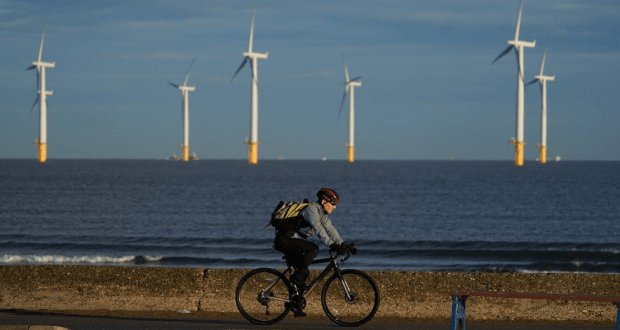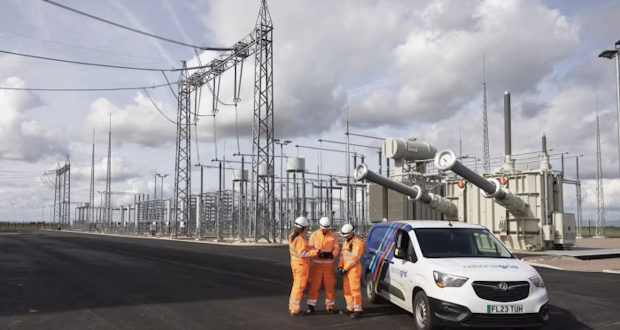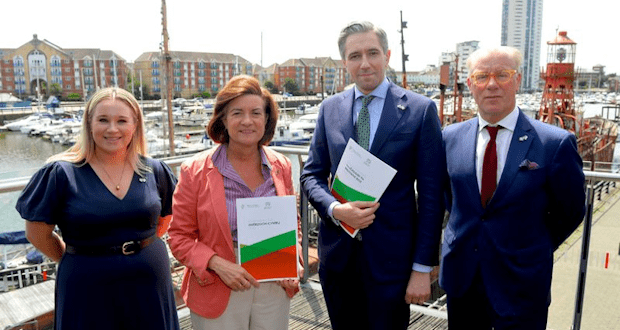The plan will aim to boost UK energy production, including from renewable sources, in a bid to move away from Russian oil and gas.
Boris Johnson has been holding talks with figures from the nuclear, renewables, and North Sea oil and gas sectors ahead of the launch.
Ministers are also under pressure over soaring energy bills facing consumers, amid rising gas prices.
So what can we expect the strategy to say?

Nuclear
Senior government sources have told the BBC the prime minister wants to make “two big bets” on nuclear and offshore wind in the strategy.
He has previously indicated he’d like to see 25% of the UK’s energy generated by nuclear by 2050, though the Treasury has raised concerns about the costs of targets like this falling outside of the government’s current spending review period.
At the moment, the UK has six plants that can supply about 20% of UK electricity demand, with 15% generated in 2020. Most of their reactors are due to cease operating and be shut down before 2030.
Funding the construction of new plants has proved challenging in recent years, and complications over costs were a factor behind the energy strategy being delayed.
Business Secretary Kwasi Kwarteng has confirmed ministers will set up a new body to oversee the delivery of new nuclear plants.
The government also recently acquired new powers to finance nuclear projects by allowing developers to add costs to customers’ bills during construction.
Ministers argue this will prove less expensive for energy users than current funding models, where these costs can only be added after a station starts generating electricity.
The government also plans to take a 20% stake in a £20bn project to build a new plant at Sizewell C in Suffolk.
Wylfa, a decommissioned nuclear power plant on the island of Anglesey in north Wales, is among half a dozen sites already being considered for new stations.
Welsh Secretary Simon Hart is set to visit the United States this week for talks with US firms Bechtel and Westinghouse about reviving plans for a new site, following the withdrawal of Japanese company Hitachi two years ago.

Wind
Mr Johnson has also expressed his desire for a “colossal” offshore wind farm to industry leaders.
A senior source told the BBC he is looking for a “Kate-Bingham like” figure to lead the expansion of offshore wind – in a reference to the venture capitalist who led a government taskforce on buying Covid vaccines.
The PM is said to have told industry leaders that if the UK “could create a vaccine in a year” then he wished to do the same with a large offshore wind farm.
There have also been discussions about boosting onshore wind farms, which have faced greater hurdles for approval since planning laws in England were tightened in 2015.
A senior government source has also told the BBC Mr Johnson was “horrified” when he was told that onshore wind turbines could take a “day” to put up, but “10 years” to approve in England.
Some Tory activists have opposed their impact on the landscape, despite polls suggesting high public support for them, and cabinet ministers are split over whether planning laws in England should be relaxed.
The business secretary favours a relaxation, but has said any expansion of onshore wind would need community consent and benefits.
Transport Secretary Grant Shapps has said he did not favour “a vast increase” in onshore wind farms, calling them an “eyesore for communities”.
But it’s possible the strategy may commit to just reviewing the planning laws – even if no decisions have yet been made.
The BBC has been told incentives – such as cheaper energy bills – are being considered for people who live near new onshore wind farms, and these could be introduced whether planning laws in England are relaxed or not.
That could mean those benefits are felt more acutely in Scotland and Wales, where planning rules are already less stringent.

Oil and Gas
The strategy is also likely to touch on increasing domestic production of gas and oil in the North Sea.
However, ministers say they don’t want to burn more gas, but instead produce more of it domestically while they transition to renewables.
Ministers are likely to “keep the door open” to the controversial practice of fracking – extracting shale gas from the ground – but a government ban on it remains in place.
Some Tory MPs have pushed for the government to lift the ban, though it’s understood they have no plans to unless science changes and deems it safe.

Solar
Solar power is also expected to be part of the strategy – with incentives also being considered for people who live near new large solar farms constructed in England.
Supporters say a new generation of farms say they could provide a source of renewable energy to power hundreds of thousands of homes.
But plans for new farms have faced local resistance, with a number of Conservative MPs also voicing their opposition.
Original article – https://www.bbc.com/news/uk-politics-60982346



